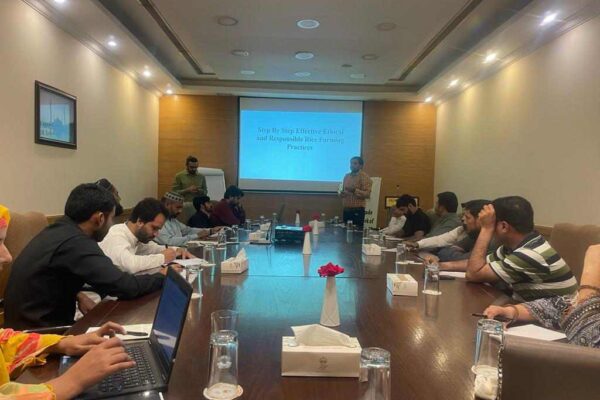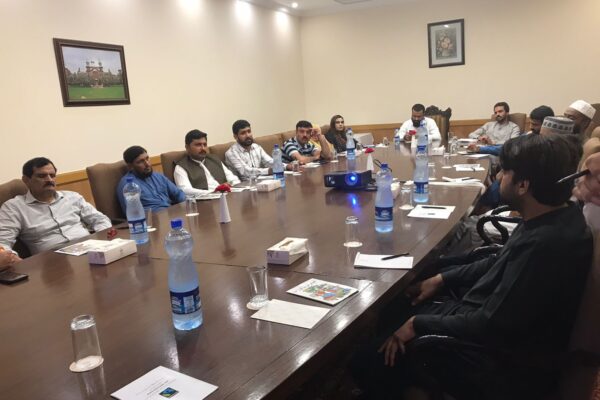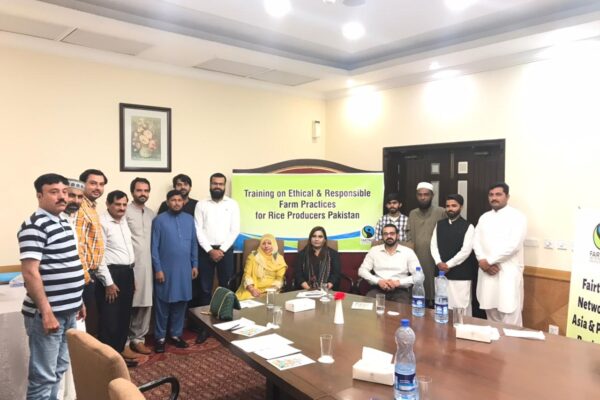Rice farming is a critical component of global agriculture, providing sustenance to a significant portion of the world’s population. However, conventional practices associated with rice cultivation have raised concerns about environmental degradation, social equity, and long-term sustainability. In response to these challenges, the Fairtrade Network of Asia, and Pacific Producers (NAPP) organized a 2-day training on ethical and responsible rice farming practices in Lahore, Pakistan. This training aimed to empower rice growers with knowledge and strategies to foster sustainable, ethical, and responsible farming practices. A total of 16 members from 3 rice growing organizations in addition to 3 Fairtrade NAPP staffs including Hope Farmer Association, Masoom Support Foundation and Atlas Fairtrade Farms Association, participated in the training.

The training content was meticulously crafted based on the needs assessment that ensures comprehensive coverage of ethical and responsible farming principles. Subject matter experts were consulted to guarantee accuracy and currency. This resulted in the development of five distinct training modules. The training sessions were designed with a strong focus on interactivity which involved participants in activities such as group discussions to express their opinions on various issues, analyzing case studies, and engaging in practical simulations. This interactive learning approach fostered an environment conducive to effective knowledge sharing. Dr. M. Abu Bakar Saddique, an Assistant Professor at the Institute of Plant Breeding and Biotechnology, MNS University of Agriculture Multan, served as the expert trainer. His extensive expertise in ethical and responsible rice farming enriched the training sessions. In addition, Malik Jameel, deputy coordinator, Central Asian region attended the training.

Malik Jameel, Deputy Coordinator, Central Asian Region
Day 1: Building a Foundation for Ethical Rice Farming
The first day of the training began with a recitation from the Holy Quran. Ms. Sarah Anum, Program Consultant for Pakistan NAPP, welcomed the participants and highlighted the key topics to be discussed during the training. She introduced the objectives of Fairtrade and NAPP and explained their dedication to improving the livelihoods of farmers, mitigating climate change, and benefiting society at large. Dr. M. Abu Bakar Saddique, an expert in ethical and responsible rice farming, led the training with three informative talks:
- “Wake-up Call: Climate Change Threatening Rice Farming”: Dr. Saddique emphasized the critical role rice farming plays in climate change due to the production of CO2, CH4, N2O, and the consumption of water. He emphasized the urgent need to adopt climate-smart approaches by introducing practices such as Alternate Wetting and Drying (AWD), Vietnam’s 1M/5R approach, and a System of Rice Intensification (SRI) to mitigate climate impacts.
- “Ethical and Responsible Rice Farming”: This talk focused on the importance of ethical and responsible rice farming including adopting sustainable practices that prioritize environmental stewardship, social responsibility, and economic viability. Key principles and practices were discussed, including agroecological farming, water management, conservation of wetlands, reduced chemical inputs, and fair labour practices.
- “Rice Farming Today”: Dr. Saddique highlighted the diversity of rice farming methods worldwide, including traditional flooded rice cultivation, rainfed upland rice cultivation, System of Rice Intensification, Aerobic Rice Cultivation, Floating Rice, Dry Direct Seeding, Terraced Rice Farming, Submerged Soil Rice Cultivation and Wetland Rice Cultivation. These methods are influenced by local environmental conditions, technological advancements, and cultural practices. As agriculture continues to evolve, farmers adopt methods that are best suited to their specific circumstances.
Day 2: Implementing Ethical and Responsible Practices
The second day of the training began with participants summarizing the previous day’s activities. This summary provided everyone with a more favourable opportunity to remember and reestablish a connection with the day’s lecture. Dr. M. Abu Bakar Saddique continued with two more talks:
- “Step-by-Step Effective Ethical and Responsible Rice Farming Practices”: Dr. Saddique provided a comprehensive overview of best practices throughout the rice farming cycle, from site selection and preparation to post-harvest handling. Topics included variety selection, seed treatment, nursery management, water management, nutrient management, and integrated pest management among others.
- “Modern Ways of Rice Management”: This session explored modern techniques and technologies that could revolutionize rice farming. Precision agriculture, hybrid rice varieties, alternate wetting and drying, and smart irrigation management were discussed. The potential of robotics and automation in rice farming was highlighted as a promising avenue for increased efficiency.
The two-day training on ethical and responsible rice farming provided valuable insights and strategies for rice growers in Pakistan. By adopting sustainable practices and embracing ethical farming principles, the rice farming sector can address pressing issues such as climate change, environmental degradation, and social equity. The commitment of organizations to implement these practices signals a positive shift toward a more sustainable and responsible rice farming future. As technology continues to evolve, the integration of modern techniques, including precision agriculture and robotics, holds great promise for further improving productivity and sustainability in the industry. Ethical and responsible rice farming is not just a path to sustainable agriculture; it is a path to a brighter and more equitable future for farmers, communities, and the planet.
Testimonials:
1. “Attending the NAPP-organized training was an invaluable opportunity to connect with peers and acquire valuable knowledge. I extend my gratitude to NAPP for organizing this enlightening event focused on ethical farming practices. The training covered a diverse range of topics in addition to featuring expert speakers that made the experience informative and engaging. The sessions were well-structured, leaving us with actionable insights to apply in our work. The interactive format encouraged meaningful discussions, enhancing our understanding of the subject matter. In particular, the training shed light on ethical and responsible farming practices for rice cultivation. We have pledged to promote the key takeaways including eradicating child labour, promoting democratic decision-making and gender inclusion, minimizing water use through innovative methods and advocating for Green Energy adoption among others at the organizational level. We eagerly anticipate future editions of such well-organized and enriching experiences. The presentations and trainings were insightful, inspiring us to drive positive changes within our organizations. We are thankful for the knowledge gained during these informative sessions, which were particularly relevant to our roles. The knowledgeable and engaging speakers captivated our attention.” – Mr. Hafiz Muhammad Ismail from Atlas Fairtrade Farms Association.
2. “I am grateful to Fairtrade and NAAP for providing this invaluable opportunity to benefit from Dr. M. Abu Bakar Saddique’s expertise. During the training, I acquired new knowledge, including insights into the application of artificial intelligence in rice farming. I also gained insights into water-saving strategies, such as the implementation of alternate wet and dry methods and the system of rice intensification. Furthermore, I learned about the environmental benefits of adopting green energy solutions and reducing the use of fertilizers and pesticides. The training introduced me to the concept of utilizing a crop calendar for effective rice crop management and provided guidance on best practices for rice cultivation, management, harvesting, and storage.
Additionally, the training underscored the critical importance of addressing child labour as a genuine threat to our society’s future. It emphasized the empowerment of women and their involvement in decision-making processes as essential components for a better future. Overall, this training was exceptional, and Dr. M. Abu Bakar Saddique effectively shared his expertise on the subject, making it a highly enriching experience.” – Mr. Abdul Majeed, Hope Farmers Association.








